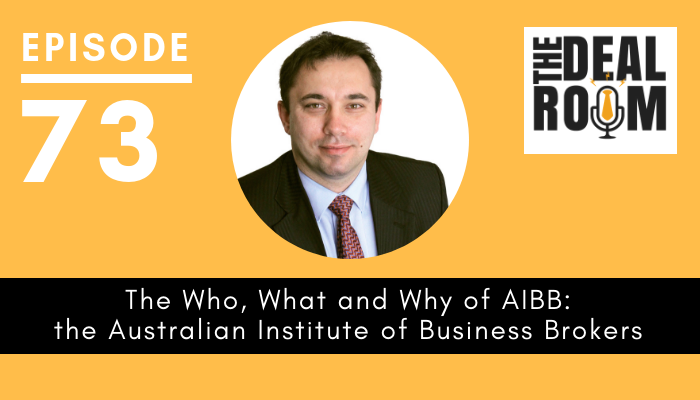
Ever heard of AIBB? In this episode, we talk about the Australian Institute of Business Brokers – who they are, what they do, and why you should consider being one of their members or partners. To help give depth to this discussion, we brought back Zoran Sarabaca of Xcllusive Business Sales, the current Chairman of AIBB.

Episode Highlights:
- Who is a business broker?
- Education from AIBB
- Purpose of AIBB
- Raising the barrier to entry and improving the industry
- Advocacy side of AIBB
- Exclusive business sale database for members
Joanna: Hi, it’s Joanna Oakey and welcome back to The Deal Room podcast brought to you by our commercial legal practice, Aspect Legal.
Today we have the fabulous Zoran back again. But today we’re talking about a slightly different topic to the topic that we spoke about a few podcasts back. We’re talking today about the Australian Institute of Business Brokers.
So Zoran, you’re the (what do they call it) Chairman of AIBB now. So I thought you’d be perfectly positioned to have a bit of a chat to us about who the AIBB is and maybe it might be interesting for us to drill into what support there is in the industry for brokers. Just as I’m kicking off, I guess the first thing that I want to say that I find interesting is this terminology brokers. Right? And obviously it’s embedded into AIBB, the Australian Institute of Business Brokers.
But I find in my travels that the word broker can be a nuanced sort of term you. I guess technically speaking from the licensing provisions, a broker is anyone who is sort of broking a deal between buyer and seller of a business. But it’s interesting how it’s nuanced in the industry. What’s your thoughts about it all?
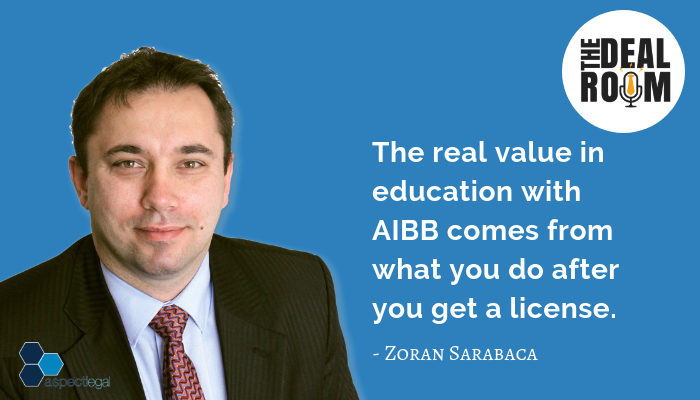
Who is a business broker?
Zoran: Well, some like it. Some don’t. I don’t think it matters. What really matters is what you do.
Broker tells that you are actually kind of broking a deal and representing both buyer and the seller. You are on the side of the deal because that’s the only way that the buyer gets a business and the seller sells the business. But in effect, you’re actually representing, you’re acting as an agent for the seller. Your loyalty and obligation is to the seller.
I’m with you. Maybe It’s not the best word to use and some of the licensing authorities actually don’t call it broker. But they call it agent. But nevertheless, I think people understand where the broker sits and I don’t think it’s that important.
Joanna: Maybe in a future episode we should just talk about these licensing regime as a whole because I just find it interesting.
Zoran: To say the least.
Joanna: To say the least. Like how is it that we’re tied so closely to real estate.
Zoran: A lot of new members call AIBB. They say something like this. Look, I’ve got this license and I was told what not to do. But no one told me or no one taught me how to do it. We get a lot of new members. Well in fact I’d say that most of the membership are new guys in the industry, coming as an influx of the new members.
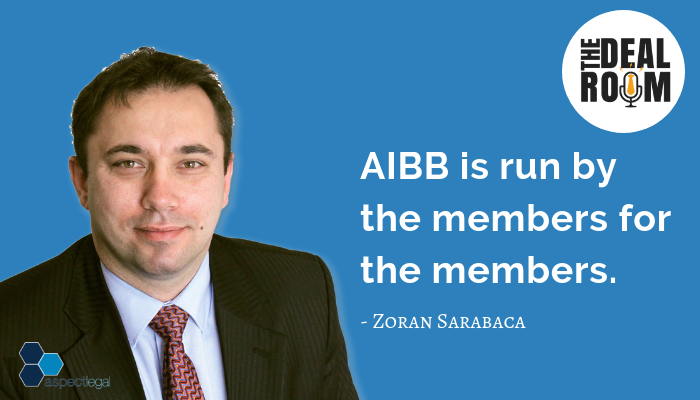
Education from AIBB
Zoran: As AIBB we do provide, through a third party, licensing if somebody is interested in actually becoming a business broker and getting licensed. For most of the state and territories, we provide licensing courses. But real value in education with AIBB comes from what you do after you get a license.
We know the three levels of education. First one is Introduction to Business Broking which teaches you basics, introduction to commerce and industry and it gives you all the basics. Later on we can go through the actual subjects that are covered.
After that, you need to have a minimum of two years experience in the industry before you can do another training, which is Certified Practicing Business Brokers. This goes in way more detailing all of the subjects and all the points of business sales.
AIBB also runs a very successful business valuation course. You can register a business regular accreditation. AIBB is registered with international valuers board.
It’s quite complicated. It’s a new industry. But actually, if you complete the course, a prerequisite for that is five years of experience in business broking. You then can become a registered business valuer.
On past meetings, we were talking about how the valuation course has been running for about five to six years. And so far, it looks like the members generated for themselves, amongst themselves about 10 million dollars worth of revenue just as a direct consequence of that course.
The interesting thing is there’s about 150 graduates from the course. But only about half of them are operating as business valuers. The other half done it because they wanted to become much better in business sales. Every single one of them, where we’d done a survey, said it made us much better business broker, doing a course.
The course is fairly intense. You are thinking it goes over eight days with the major assignment and then the peer review. It’s not cheap and not everybody passes it, which is a really good thing. Because you really have to have to demonstrate a high level of competence in order to pass and become a registered business valuer with the Australian Institute of Business Brokers.
Joanna: So when you say it’s not cheap like what are we talking here?
Zoran: The valuation course is about six thousand dollars.
Joanna: Right.
Zoran: But look, two valuations and you’ve got your money back and made some profit at the end. The industry is quite large.
Joanna: And so, in terms of the sorts of things that the valuation course covers, is it sort of structured more towards the sub one million market or does it also cover larger SME?
Zoran: It does cover SMEs. It doesn’t go in corporations or listed companies or very large businesses. In fact, it covers everything that business brokers are selling, that anybody who works in the business broking industry would sell; a certain type and size of the businesses, which is mainly private business up to mid-market. Mid-market seems to be 10 million plus. Anything up to 10 million we’d cover.
Having said that, you really need experience in the field in order to get a maximum out of course. You can complete the course if you want. But if you don’t operate in the field, you won’t be registered as a registered business valuer.
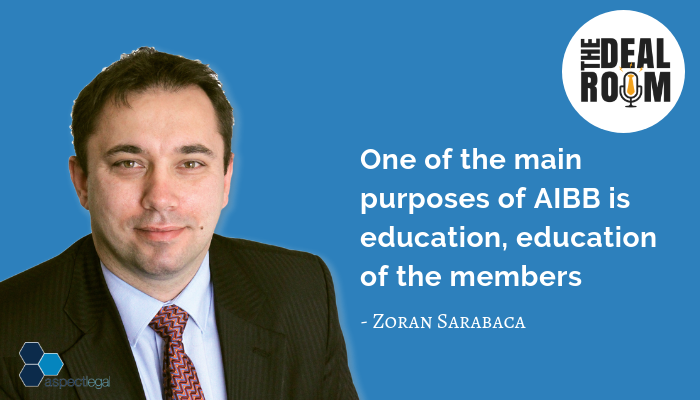
Purpose of the AIBB
Joanna: And so maybe, if we circle back a bit and then look at the AIBB as a whole, what does the AIBB see its purpose of being as? Where does it see that it sits?
Zoran: Well, you call it not for profit. It is for profit. We try to make a profit every year in order to provide value to our members. We need to have a profit. We need to make money so we can spend the money.
But it’s run by the members for the members. It’s run as a voluntary organisation. The board is elected every year. It is always elected from the membership. There are some paid employees of AIBB and contractors, but their main role is management of the organisation.
The institute has been operating since 1989. It started in New South Wales. It was a common association, New South Wales Association.
Joanna: So it actually only started in 89. That’s interesting, isn’t it?
Wow, so that’s. Let me do my math. What’s that? That’s 28 years. Right?
Zoran: Twenty-eight years. Well done!
All the licensing, and you mentioned that at the beginning, we’re going to talk about the licensing for business brokers. All the licensing is actually real estate centric.
Most of the business brokers at the beginning is selling retail shops. That’s how the business brokers industry years ago was kind of founded. That’s how it started. But now there are business brokers dealing with much more sophisticated and much bigger transactions.
Debt licensing it’s kind of strange and we don’t do it. [2.9] There are some checks and red tape that it’s really not relevant to business broking and selling businesses.
Joanna: That’s the complaint that I hear, like literally Zoran, all the time about the issue. I can see that this perhaps is a big hole that AIBB needs to fill in. The licensing regime itself doesn’t appear to give the skills that really relate to what the job of being broker or an advisor does.
Zoran: Absolutely doesn’t give us skills. Tells you what not to do, but it doesn’t tell you how to do it right.
One of the main purposes of AIBB is education, education of the members. A must-go conference for anybody who is in business sales or wants to work with business brokers is the Australian Institute of Business Brokers Conference.
This year I think it’s going to be in August and it’s in Melbourne. Normally attracts between 100 to 150 delegates. It’s a big event. It goes on for three days. There is a lot of education, a lot of peer to peer networking, a lot of support amongst the community that you’re going to receive by being there and meeting these people.
Just back to your question, what else AIBB does. Well, there are four things. There is membership education. There is advocacy. There’s membership support, networking and social peer interaction.
In terms of advocacy, we constantly work with federal and state government, tried to lobby. Look we’re a small organisation, about 350 members. But it’s growing.
We actually believe there’s about a thousand people that actively, full time work as business brokers in the country. So we’ve got about a third of the community as members and we think we’re going to get to about half of that.
Joanna: When you look at those stats, do you think those stats also cover these people who are using the banner of advisor or M&A advisor or M&A consultant? Because some of these people are technically brokers, where they’re remunerated on transaction completion, by proportion of the transaction value and all of that. I mean technically they’re brokers, right? Technically.
Zoran: Well, technically they should be licensed. But they’re not.
So what happens. I think legislation in New South Wales at least says that if you are assisting with a sale and as a remuneration you get a financial or some other gain, you need to be licensed as a business broker.
Joanna: But then, this is where the complaints in the industry come from. Particularly at that end when you’re advising multimillion dollar organisations on strategy. It’s got nothing to do with real estate.
Zoran: Nothing, absolutely nothing. Yeah.
Joanna: So I understand the issues. But I think what that creates is you’ve got this sort of broad market of brokers and advisors who are dealing in different areas all required to be licensed under the same regime, which really has no connection to the work of a broker or an advisor.
But I think the issue that it creates is the lack of a place for all of those people working in the industry and coming into the industry to get educated. And so I guess this is the whole potential AIBB is filling.
On that note then does AIBB, in terms of the type of education that it provides, do you think it covers the broad market of brokers? So for those mid-market and advisors who are dealing with high level transactions, is there information that can be useful to them as well?
Zoran: Oh absolutely. Look, introduction course covers an introduction to the industry, managing risks, analysing leases, analysing employee, reading the financial statements, appraising the business, listing a business.
Then second level of this is actually certified business broker, which are more advanced courses. It talks about dispute resolutions, stamp duty, capital gain liabilities, compulsory acquisition by the government. It talks about sale of businesses over five million dollars. It talks about the different structures. It talks about the structure deal. So it really gets into that SME, not the small, but medium market.
Then the regulation course goes even further and covers a lot more like legal report writing skills, expert witness in legal disputes and so on. There is no standardized education for business brokers anywhere but in the Australian Institute of Business Brokers.
Joanna: Oh, and this podcast of course.
Zoran: And this podcast as well.
What we tried to create is a career path for somebody, so not to look at this as okay I’m going to come in. I’m going to do a course with the government today. It’s going take three days and now I’m a business broker.
But actually, it goes over five years if you want to do all the courses. As you’re gaining more experience, you get educated through the process. In the end, look I’m biased, but I would not deal with anyone who is not a member of the Australian Institute of Business Brokers.
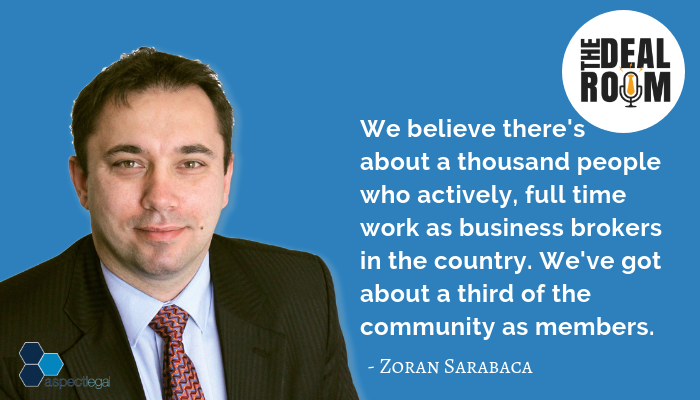
Raising the barrier to entry and improving the industry
Joanna: Well look, I think it’s a really good point because I think there’s sort of a low barrier to entry for business broking. Right?
Zoran: Very low.
Joanna: Whilst the licensing regime is a little bit painful for people who perhaps feel it doesn’t meet the actual requirements of the job. It’s actually fairly simple I guess to go in and do the few days and sit the exam at the end. There’s an exam at the end, isn’t it? Anyway, whatever it all is and get your license at the end of the day.
I think the low barrier to entry creates this issue in the market as a whole, which is an issue for all brokers that there are you know I guess you call them cowboys in the market who perhaps don’t have a high level of understanding of how the deals operate. It can be hard for the end consumers to differentiate between somebody who is experienced versus someone who perhaps doesn’t have that education behind them. I guess at least AIBB is giving some sort of external validation for the level of education that someone has had in this area.
Zoran: Well yes, that’s a part of it. Not just education and experience, but also code of conduct that all the members have to abide by i.e. conflict resolution, if one arises, which is rare. But there is that.
And also, you’re responsible. You see your peers all the time. Everybody that I know who is in the institute always tries to improve the industry as a whole.
I really think that the public, and look I don’t see them as consumers, because most of the people we deal with are business owners. They are sophisticated buyers or sellers. But I think that they benefit greatly by using somebody who is accredited by AIBB rather than somebody who is not.
Not to say that someone who is not is not as good. But at least you got some sort of checklist, something to start with and somewhere to go if things don’t go your way.
Joanna: Yeah. I think that’s a really good point.
And then just flipping very quickly back to the advocacy side of things. I’m just interested in what the current areas are that require some this advocacy assistance at the moment.
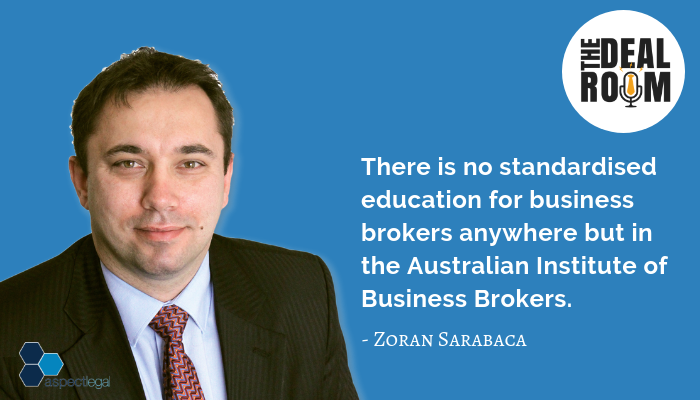
Advocacy side of AIBB
Zoran: Well there is a change coming in the real estate industry in NSW, in licensing. The act was quite [00:18:46] complicated [0.7] because it doesn’t touch on transfer of digital information or digital communication at all. So that is changing and I think it past the parliament and now waiting to be written in act and to become law.
The Australian Institute of Business Brokers were pretty much in every meeting. We always put our submissions. We talked to lawmakers and in some parts we were very successful, in some parts not so successful. But god damn it, we tried.
Joanna: I love that attitude.
What were you actually pushing for? What was your perspective? What were the issues with the changes?
Zoran: Well not to go into too many details. New South Wales is the only state at the moment that the business brokers license is separate from the real estate license. Government’s got a problem with that, at least here in New South Wales. I was a bit closer to that then what was happening in Victoria.
As a part of that, government wanted to abolish the business broker’s license and they managed to do so. Now it’s all under real estate license. Because you’re talking about a few hundred business brokers and you’re talking thousands of real estate agents. It would be good to have a separate legislation. You can’t have it, and that’s why.
So that merger we tried to manage as much as we could to make it less obstructing for people, that selling end for people operating in the industry as well.
Another thing that we were fighting for is actually increased barrier to entry. I think to a great extent I think the new act will. At the moment, you can go do the course, get the license and open your own business. They at least introduced minimum of two years experience before you can get a licence and they put up certain levels of licensing, which I believe is going to be corporate license and then licensing charge as well.
Going forward I think unless you’re licensed, you won’t be allowed to sign the agreements. So they’re trying.
Joanna: Okay, interesting. Fabulous. All right. Well look, thanks Zoran so much for your time today. I think it’s really interesting looking at AIBB and understanding not just the education that it does provide, both from a broker’s perspective and obviously as you said the valuation perspective. I think that’s another interesting sort of consideration for brokers and M&A advisors out there.
But also, in terms of sort of the broader role that it’s sitting in from an advocacy perspective. Do members themselves get very involved in the advocacy side? Or is it essentially the people who stood up and said yes I’m prepared to take on an executive role?
Zoran: Well, the executive role changes. There are also chapters and there are also volunteers. When the board needs a bit of a hand, it’s going to be given to a member to actually run with it.
I’d say that probably 20 percent of the membership is constantly involved in running of the AIBB and there are changes. Everybody does the time.
Joanna: Yeah. And sorry, just before we finish. Just a few quick questions I just suddenly thought of that I’d be interested to understand on the registered valuers side of things with AIBB. Can people other than brokers do the valuation course?
Zoran: They can complete the course, and they’re going to get a lot out of the course. But I don’t think they can be accredited as AIBB valuer.
Joanna: Right.
Zoran: Unless they actually operate in the industry. It’s heavily reliant on business selling experience and that is a really big value of the course, a really big value. That’s something that you get out of employing a business valuer from AIBB rather than somebody else. Because they work on transaction every day and that gives them valuable knowledge as well as comparative data. They know what’s happening in the industry. They know what is selling, what’s not selling.
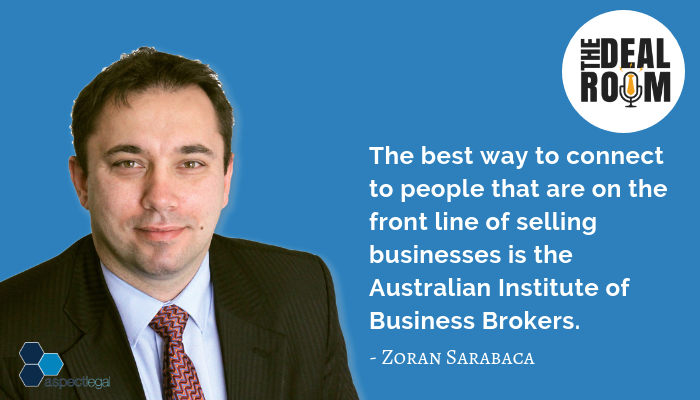
Exclusive business sale database for members
Zoran: A couple of things that I just would love to add, unless we have ran out of time. AIBB has got the largest database, which is called biz stats only available to members, largest database of data for sold businesses in the country.
Joanna: All right.
Zoran: As a member, if you’re valuing a petrol station, you can go there and see petrol stations sold. Have a look how much they’re selling. If you were an import export business, you can see similar businesses and actually extract the data. Use this in your selling, when you’re appraising businesses, but also use this in your regulation. No one else has got access to the same extent as we do.
Joanna: How does the data get into that system?
Zoran: Contributed by the members.
Joanna: Oh by the members themselves.
Zoran: All the members contribute.
Now we’re working on a project because about a thousand or fifteen hundred or whatever it is (I can’t tell you an exact number) of pieces of data. So this year we’re making a real push and we actually employed the external advisor who’s going to do a feasibility study and see how can we potentially make this to the public or how can we increase it, how can we make it better.
There’s a huge need for something like this for anybody that works in the business sales industry. So probably beginning of the next year, we’re going to make some announcements.
Joanna: Feels like Monday. Feels like just around the corner.
Zoran: Yeah just around the corner.
Joanna: Probably will be by the time this airs, so anyway.
Zoran: And one more thing that I want to say for anybody who works in the industry and is not a business broker, the best way to connect to people that are on the front line of selling businesses is the Australian Institute of Business Brokers.
Come on the conference. Everybody is welcome on the conference. Come and meet the people. Extend the network. Put a hand for the sponsorship. You know we need a few bucks to help us out going forward. But every partner that we have financially benefits immensely, because I can even tell you how many millions and how many hundreds and thousands of businesses are sold by the members of AIBB every year.
Joanna: I like that. So this is a call not only to people who are interested in becoming part of the AIBB. Or maybe you’re already a member and this is a good reminder for you of the sorts of work that AIBB is getting involved in and the sorts of value that they can provide to you as a member. But also, a call out to our potential sponsors out there. Is that right Zoran?
Zoran: Absolutely.
Joanna: Throw us the money, he says. And obviously, sponsorship of AIBB then gets access to the brokers who are part of the database.
Zoran: Look, what we do as sponsorship. It’s not the sponsorship in the normal sense of the word that you pay some money and you put your banner there. But you actually get access to all the members and there are particular members who will be assigned to you, who will help you get maximum out of your sponsorship. So we tail a sponsorship, for whatever the sponsor wants limited by law.
Our goal, and it has been working, some people have been sponsoring us for 10 or 15 years now. We make sure that it works for the sponsors. So we don’t call them sponsors. We call them partners.
So if you partner with AIBB, we are going to make sure that your contribution gets paid back as many times as we possibly can make it pay back to you. We do need the lawyers as sponsors so thanks for putting your hand out, Joanna.
Joanna: Good work, Zoran. I love it. I love it. Always be selling your AIBB. Was there anything else you wanted to throw in there?
Zoran: Well look, if anybody wants to inquire about membership or know more about the AIBB, go on aibb.org.au website or just Google Australian Institute of Business Brokers. There are several ways. You can send us an e-mail or make a phone call.
We have a membership person, membership engagement person. She will talk you through what the benefits of joining are. If you want to talk to somebody on board or if you want to talk of any previous members, by all means we’ll provide the contact.
Hope to see all the brokers in August in Melbourne on the biggest conference for business selling in Australia, which happens every year and it goes on for three days.
Joanna: Maybe we might do another episode just before that conference.
Zoran: We should. Well we need to do another episode with our future sponsor. By that time, our sponsor.
Joanna: I love it. I love it. I love ABC. Good work, Zoran.
Thank you so much for coming on board Zoran. I think the AIBB fills in a really important gap in this industry. Obviously, we’re trying here too on The Deal Room podcast as well.
Zoran: You do.
Joanna: Between both of us, hopefully we can cover the lot. As we talked a little bit about the advocacy side, I really think that’s extraordinarily important as well because I think the industry needs a strong voice. Obviously there’s lots of different rules for how the licensing regime works. I think there’s probably a lot of potential for movement that could help the industry really tighten its belt into the future. So anyway, I think there is a really important need for advocacy in the area as well. You’re doing a great job, Zoran.
We’ll be back before the August conference in 2019 to talk a little bit about it.
Zoran: Thanks Joanna. Bye!
Joanna: Now that’s a wrap for this episode with Zoran Sarabaca all about the Australian Institute of Business Brokers. If you’re interested to learn more about AIBB, you can visit their website at www.aibb.org.au or check out our show notes at www.thedealroompodcast.com where we’ll link through to their website. There you will also find a full transcript of this podcast episode if you would like to read it in more detail.
I hope you enjoyed what you heard today. If you did, please subscribe to the Deal Room podcast on Apple Podcasts or your other favorite podcast player to get notifications straight to your phones whenever a new episode is out.
Thanks again for listening in! This has been Joanna Oakey and the Deal Room Podcast, a podcast proudly brought to you by Aspect Legal.
Our Business Sales and Acquisitions Services
Aspect Legal has a number of great services that help businesses prepare for a sale or acquisition to help them prepare in advance and to get transaction ready. And we’ve also got a range of services to help guide businesses through the sale and acquisitions process.
We work with clients both big and small and have different types of services depending on size and complexity. We provide a free consultation to discuss your proposed sale or acquisition – so see our show notes on how to book a time to speak with us, or head over to our website at Aspectlegal.com.au
Disclaimer: The material contained on this website is provided for general information purposes only and does not constitute legal advice. You should not depend upon any information appearing on this website without seeking legal advice. We do not guarantee that the contents of this website will be accurate, complete or up-to-date. Liability limited by a scheme approved under Professional Standards Legislation














